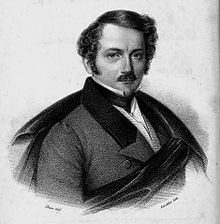Gustav Nicolai
Gustav Alexander Wilhelm Nicolai (born May 28, 1795 in Berlin ; † December 21, 1868 there ) was a German writer and composer .
Life
Nicolai was a son of Carl Friedrich Wilhelm Nicolai, Privy Chief Financial Officer and Director of Prussian Maritime Trade , from his marriage to Friederike Sophie Riemer. He was educated in Königsberg in the Neumark , where he attended high school and received lessons from the organist Gracht. In 1812 he returned to Berlin and briefly visited the Gray Monastery . Johann Philipp Schmidt gave him piano lessons . In 1813 he took part in the Wars of Liberation and then studied in Breslau with Friedrich Wilhelm Berner . From 1820 to 1843 he was a division auditor in Berlin and then a private scholar.
His friends included the composers Adolf Bernhard Marx , Gaspare Spontini and Carl Loewe , for whom he wrote the oratorio text The Destruction of Jerusalem , which Loewe set to music in 1833. For the text Nicolai received from King Friedrich Wilhelm III. a golden box as a gift.
Nicolai became widely known with his travelogue Italy as it really is (1834), in which he sketched a very unfriendly picture of the country. She was heavily criticized, including by Friedrich Wilhelm Gubitz . Nicolai sued unsuccessfully for insult against the review in Blätter für literary entertainment of September 1, 1834 (No. 244). The judgment made legal history because it defined the law of literary criticism.
Among the proponents of the script was King Friedrich Wilhelm III, who awarded Nicolai the Golden Medal for Art and Science.
From 1835 to 1843 Nicolai corresponded with Robert Schumann and wrote several essays for his Neue Zeitschrift für Musik . The composer Otto Nicolai , who also sent correspondence reports to Schumann, refused to be confused with Gustav Nicolai.
family
Nicolai was married to Henriette Dorothea May and after her death from 1844 to Leopoldine Concordia Cölestine Grothe (* 1817, † July 11, 1852). In 1833, 1834, 1836 and 1837 there are four births of children who each died in infancy, as well as the children Arthur Gustav (1845–1846) and Leontine Cath from the 1840s. Valerie (1848–1868) and Leontine Rosamunde (* 1850).
Books
- The consecrated, or the cantor of Fichtenhagen. Humoreske in two parts , Berlin: Schlesinger 1829; 2nd ed. 1846
- Jeremias, the people's composer, a humorous vision from the 25th century , Berlin: Wagenführ 1830
-
Italy as it really is. Report on a strange journey in the Hesperian climes as a warning voice (for all who long for it) , 2 volumes, Leipzig: Wiegand 1834 - 2nd edition 1835 (numerous reviews of the first edition are attached)
- Volume 1 (digitized version)
- Volume 2 (digitized version)
- New edition of the first edition from 1834, annotated and supplemented with contemporary reviews and documents on litigation for insult. Berlin 2016, ISBN 978-3-945831-07-6 .
- Arabesques for music lovers , 2 volumes, Leipzig: Wigand 1835 (digitized version)
Compositions (selection)
- op. 1: The Singer Journey , ballad based on a text by Ernst Schulze (1836)
- op. 2: The girl on the bank , ballad based on the English (1836)
- op. 3–7: Twelve ballads based on texts by Ludwig Uhland (1837)
literature
- Carl Freiherr von Ledebur , Tonkünstler-Lexicon Berlin's from the oldest times to the present , Berlin 1861, p. 396f.
- Martin A. Völker , Where the lemons bloom and the fleas bite - Italy , the land of longing by Gustav Nicolai (1795–1868) and Eduard Boas (1815–1853) , in: Franciszek Grucza (ed.), Akten des XII. International Germanist Congress Warsaw 2010. Diversity and Unity of German Studies Worldwide , Vol. 7, Frankfurt am Main: Lang 2012, pp. 185–190
- Robert and Clara Schumann's correspondence with correspondents in Berlin 1832 to 1883 , ed. by Klaus Martin Kopitz , Eva Katharina Klein and Thomas Synofzik (= Schumann-Briefedition , Series II, Volume 17), Cologne: Dohr 2015, pp. 473-489, ISBN 978-3-86846-028-5
Web links
Individual evidence
- ^ Annals of the German and foreign criminal justice system, founded by Julius Eduard Hitzig, continued by the court directors Dr. Demme in Altenburg and Klunge in Zeitz, Volume 3, Altenburg 1837, pp. 180–218 (digitized version )
| personal data | |
|---|---|
| SURNAME | Nicolai, Gustav |
| ALTERNATIVE NAMES | Nicolai, Gustav Alexander Wilhelm (full name) |
| BRIEF DESCRIPTION | German writer and composer |
| DATE OF BIRTH | May 28, 1795 |
| PLACE OF BIRTH | Berlin |
| DATE OF DEATH | December 21, 1868 |
| Place of death | Berlin |
